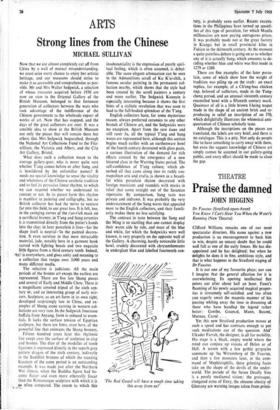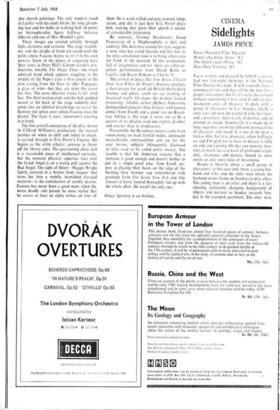THEATRE
Praise the damned
JOHN HIGGINS
Dr Faustus (Stratford-upon-Avon) You Know I Can't Hear You When the Water's Running (New Theatre)
Clifford Williams remains one of our most spectacular directors. His name against a new production is an encouragement to back him to win, despite an uneasy doubt that he could well fall at one of the early fences. He has dis- appointed and he has delighted; but when he delights he does it in fine, ambitious style, and that is what happens in the Stratford staging of Dr Faustus.
It is not one of my favourite plays; nor can I imagine that the general affection for it is overwhelming. Its opening intellectual fizz peters out after about half an hour. Faust's flaunting of his newly acquired magical proper- ties is tiresomely self-satisfied, and too often you eagerly await the majestic manner of his passing whiling away the time in dreaming of. those who have handled the legend rather better: Goethe, Gounod, Mann, Busoni, Murnau, Came . .
Yet this new Stratford production moves at such a speed and has contrasts enough to put such meditations out of the question. AM' Elkader Farrah, the designer, is all for mobility. His stage is a black, empty world where the mind can conjure up visions of Helen or of Hell. A screen with a few gothic gargoyles summons up the Wittemberg of Dr Faustus, and then a few moments later, at the com- mand of Mephistophilis, these grinning faces take on the shape of the devils of the under- world. The parade of the Seven Deadly Sins is a purely mediaeval vision : the grotesque, elongated arms of Envy, the obscene obesity of Gluttony are warning images taken fromprimi-
five church paintings. The only modern touch il..ucifer with his mink bikini, his long glisten- ing legs and his habit of walking half on point, an hermaphrodite figure halfway between Oberon and one of Miss Bluebell's girls.
These images are created entirely through light, darkness and costume The stage machin- ery and the sleight of hand are saved until the point where Faustus begins to revel in his own powers. Some of the pieces of conjuring have their roots in Peter Hall's Covent Garden pro- ductions, notably The Magic Flute—the much admired hand which appears waggling in the middle of the Pope's cake is first cousin to the arm arising from the floor to offer Papageno a glass of wine—but they are none the worse for that. The most effective stroke is left until last. The final oration ends and the dull, padded screen at the back of the stage suddenly des- cends like an infernal drawbridge to reveal the flaming red spikes over which Faustus must be drawn. The feast is over, tomorrow's roasting is at hand.
The fine overall conception of the play shown in Clifford Williams's production, the natural instinct on when to chill and when to divert, is carried through to Eric Porter's Faustus. He begins as the virile scholar, anxious to throw off the library yoke. The questioning about hell is a reasonable piece of intellectual curiosity, but the moment physical appetites take over the Good Angel is on a losing pull against the Bad Angel. The sight of Helen—Maggie Wright lightly covered in a bronze body lacquer that turns her into a mobile, burnished classical statuette—is the culmination of earthly desires. Faustus has never been a good man; when the seven deadly sins parade he must realise that he scores at least an alpha minus on four of them. He is weak-willed and prey to every temp- tation, and this is just how Eric Porter plays him, making that great final speech a matter of considerable poignancy.
By contrast, Terence Hardiman's blond Franciscan of a Mephistophilis is deft and cunning. The darkness around his eyes suggests a man who has tasted heaven and has lost it; the only consolation now is to bring others into the band of the damned. In this production, full of imagination and wit there are other ex- cellent performances from David Bailie as Lucifer and Bryan Robson as Charles V.
The arrival of plays like You Knots, /'Can't Hear You When the Water's Thinning prompts a short prayer for good old British Shaftesbury Avenue and points south (to say nothing of Stratford itself). On paper the product looked promising: reliable author (Robert Anderson), distinguished director (Jose Ferrer), well-known comic (Tom Ewell) and a good run on Broad- way behind it. On stage it turns out to be a quartet of TV playlets each one slightly drabber and coarser than its predecessor.
Presumably the Broadway success came from comm.:Ming on male frontal nudes, adolescent masturbation, contraception and sex for the over forties, subjects infrequently discussed in what used to be called polite society. The trouble is that Mr Anderson reckons that a mention is good enough and doesn't bother to put in a single good joke. Tom Ewell, ex- pert in playing Don Juans on the edge of the burning fiery furnace and remembered with gratitude from The Seven Year Itch and The Tunnel of Love, looked thoroughly fed up with the whole affair. He wasn't the only one.
Hilary Spurling is on holiday.











































 Previous page
Previous page